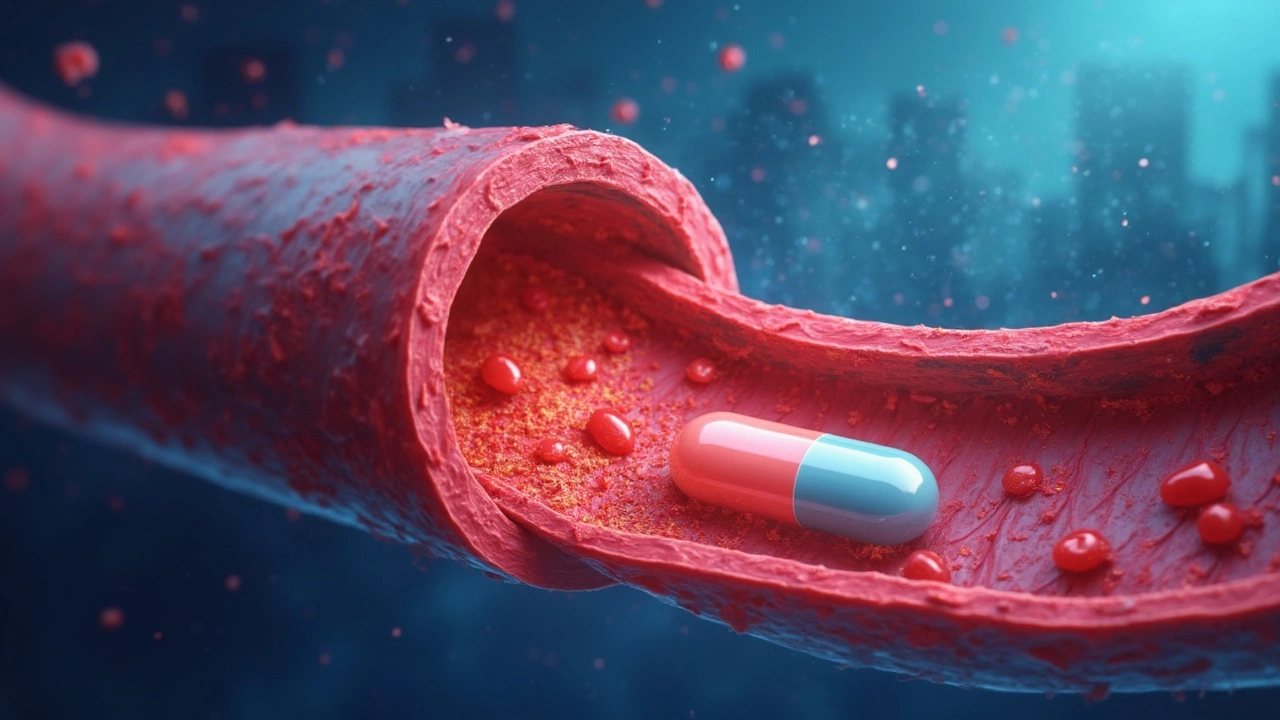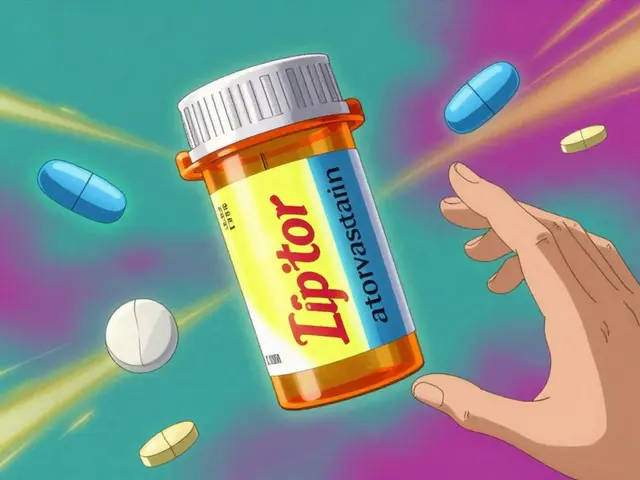Pills that promise to save lives don't always make headlines, but Lipitor has quietly redefined heart health since it landed in pharmacies back in 1997. Mention "cholesterol" at a family dinner and someone will toss out this name, often alongside tales of their last GP visit. Yet, most people—plenty of whom have a box of Lipitor on their bathroom shelf—can’t really tell you exactly what it does, or why their doctor insists they keep taking it. Here’s where things get interesting: Lipitor’s story is packed with massive numbers, big business, but the details that actually matter come down to every person popping the tablet each night after dinner. Grab a cup of tea, because this isn’t a short story. With so much confusion floating around about statins, especially Lipitor, you deserve to know what’s actually going on when that pill hits your gut.
What Is Lipitor? Understanding How It Works
Lipitor is the brand name for atorvastatin, and it belongs to a class of drugs called statins. What do statins actually do? They work by blocking an enzyme in your liver called HMG-CoA reductase, which has a key job of making cholesterol. Too much cholesterol, especially the ‘bad’ kind (scientifically called LDL), gets sticky and builds up in your arteries, making them hard and narrowing them down. Imagine your arteries like busy motorways around London; now picture years of invisible road blocks and potholes—eventually, traffic slows to a crawl, or worse, stops completely. That’s what clogged arteries do to your blood. Lipitor helps clear up that motorway.
Here’s a number that should stick with you: Lipitor became the best-selling prescription drug in history, pulling in over $130 billion worldwide by 2020. You don’t need to care about Wall Street to realise this medicine has changed millions of lives. Not in flashy ways, but usually quietly, behind closed doors, in clinics and GP surgeries when someone is told, "Your cholesterol’s a bit high."
But why is cholesterol such a big villain? The problem isn’t cholesterol itself; after all, your body needs it to build cells, hormones, and even vitamin D. The trouble is, modern diets and genetics can push your cholesterol far above the healthy range—especially the LDL type—leaving you at real risk for heart attacks and strokes. The British Heart Foundation says that over 7 million people in the UK are currently taking statins, with Lipitor (atorvastatin) leading the pack. When GPs look at cholesterol blood test numbers, they especially watch for high LDL (‘bad’ cholesterol) and low HDL (‘good’ cholesterol). Lipitor has a proven ability to lower LDL by up to 60% in some patients, depending on dose and response. There’s also a smaller, beneficial bump in HDL and drop in triglycerides (another blood fat connected to heart problems).
Is Lipitor a magic wand? Not quite. You still need to take care of your body—no statin fixes a fry-up breakfast and zero exercise. But if you pair Lipitor with sensible eating and weekly walks, you seriously cut your risk of major heart problems. There’s rock-solid evidence for this, not just in lab rats but tens of thousands of real people. One striking study, called the ASCOT-LLA trial, took over 10,000 UK patients with high blood pressure (and average cholesterol) and found Lipitor dropped the risk of major cardiovascular events by 36% compared to placebo after just 3 years.
Beyond heart attacks, Lipitor is sometimes used for people with diabetes, past strokes, or even some with kidney diseases, because their risk is especially high. These aren’t fringe cases, either. The guidelines from NICE (the National Institute for Health and Care Excellence) recommend offering atorvastatin to adults with a 10% or higher risk of developing cardiovascular disease over the next decade. That covers a lot of us past 40.
Let’s not forget dosing. Lipitor comes in various strengths—usually 10, 20, 40, and 80mg tablets. Doctors usually start low and adjust upwards, based on your blood results and risk factors. The actual dose isn’t a badge of honour; some folks respond to smaller doses, while others need the max to hit their goals. That’s why regular blood tests are a thing: to check your cholesterol levels and make sure your liver is handling the extra work. If you skip those follow-up appointments, you could be missing problems long before they show up as symptoms.
Here’s a quick summary table for what Lipitor does in the body:
| Action | Effect |
|---|---|
| Lowers LDL ("bad") cholesterol | Up to 60% reduction |
| Raises HDL ("good") cholesterol | 5-10% increase |
| Lowers triglycerides | 10-30% reduction |
| Reduces risk of heart attack & stroke | 20-40% reduction (clinical studies) |
Statins, including Lipitor, are not a cure, but a tool—one with a proven track record. If you’ve ever wondered why your GP brings up this medication every year, now you know. It’s science, with your arteries' future on the line.

What to Expect: Side Effects, Myths, and Monitoring
You hear stories everywhere—mates at the pub say their joints ache because of Lipitor, people on internet forums blame every sniffle and cough on their statin. But what’s the truth? Most people on Lipitor have no problems at all. But, yes, side effects can happen, and you deserve to know which ones are real, which are rare, and how your doctor actually keeps an eye on things.
First up, here’s what the medical world recognises as common side effects (these happen to up to 1 in 10 people):
- Muscle pain or weakness
- Digestive issues—like mild tummy pain, constipation, bloating, or diarrhea
- Headaches
- Runny nose or sore throat
For most, these are everyday-level annoyances. Occasionally, people notice tiredness. The muscle aches get a lot of attention in the press. But research—like an enormous 2022 UK meta-analysis—found actual statin-related muscle pain only occurs in around 1% of users. So, if you notice aches, tell your doctor, but don’t panic. Sometimes the cause is just a pulled muscle at the gym, not the pill. Still, muscle breakdown (called rhabdomyolysis) is rare but serious, showing up as severe pain, dark urine, or feeling unusually weak. If that happens, drop everything and call your doctor.
Less commonly, statins—Lipitor included—can raise your liver enzymes. That’s why your GP will ask for blood tests about six to twelve weeks after you start, then every year or so. Liver problems are rare, but it’s better to catch anything early. Occasionally, statins can tip up blood sugar, nudging someone toward type 2 diabetes. The risk is small but real—especially if you’re already prediabetic. Here’s the key question: does this risk outweigh the benefits? For most, the reduction in heart attacks and strokes tips the scale firmly in favour of staying on Lipitor (or another statin).
Here’s a rundown of rarer side effects (<1%), but ones you shouldn’t shrug off:
- Severe muscle weakness or pain
- Jaundice (yellowing skin or eyes)
- Unexplained tiredness, especially with dark urine
- Memory loss or confusion (still debated, but seen in rare reports)
- Severe rash or allergic reactions
If you notice anything truly odd after starting Lipitor—especially those above—get medical advice quickly.
There’s another myth that does the rounds: "Statins wreck your memory." Some people swear their brain fog started the day they began Lipitor, but repeated studies have never proved a clear link for most folks. It’s still under investigation, and authorities like the NHS say to watch for symptoms, but not to worry unless you actually notice problems.
What about interactions? Lipitor can clash with some drugs—especially certain antibiotics (like clarithromycin), antifungals, and other cholesterol medications (like gemfibrozil). Grapefruit juice is a sneaky one, too; the chemicals in grapefruit can mess with how Lipitor is broken down, leading to higher levels in your blood. That’s why you’ll often see warnings to limit grapefruit to small amounts or avoid it completely if you’re sensitive.
Here’s a practical tip: stick to the same time each day for your dose (evening works best for most, because that’s when your liver makes the most cholesterol). If you miss a dose, just take the next one as planned—don’t double up. And don’t stop Lipitor without talking to your GP, even if you feel fine. Cholesterol numbers often creep up quietly, without symptoms, and suddenly you’re facing a heart complication you never saw coming.
Quick list for what to do if you’re experiencing issues:
- For mild aches, keep a diary—note down when they happen and what you were doing.
- Report anything persistent, weird, or severe to your doctor quickly.
- Bring a complete list of vitamins and supplements to your GP—some, especially red yeast rice and niacin, can interact with statins.
- Don’t fall for social media fads promising to “detox” your liver from statins—there’s no evidence these work, and some could be risky.
- If you’d like extra peace of mind, ask for a regular blood test. NHS guidance says this is normal and helpful.
When you know exactly what to watch for, most worries about statins become a lot less scary. With clear eyes, you can work with your doctor and decide what’s truly best for you.

Living With Lipitor: Facts, Real-World Tips, and Making Statins Work for You
Everyday life on Lipitor isn’t meant to be dramatic—it’s about making quiet, steady choices that keep your arteries as wide open as the morning M32 (well... on a good day, anyway). But plenty of people have questions serious enough to keep them up at night. Am I stuck on these forever? What if my cholesterol is ‘fine’ now? Will I have to swap sausage rolls for kale chips for good?
First things first: most people end up on lipitor for the long haul. That doesn’t mean you failed—actually, sticking with it means you’re taking your future heart health seriously. A massive Swedish follow-up in 2021 tracked over 272,000 people and found those who stuck to their statins long-term saw much lower rates of heart attack and stroke compared to people who stopped early. It’s not about the medicine itself, but about consistently keeping your cholesterol under control.
Here’s the bit they don’t tell you on medicine leaflets—Lipitor works best alongside some real-world tweaks. You don’t need to run marathons or go vegan, but simple swaps matter:
- Make time for movement. Even brisk walking 20 minutes daily makes statins more effective, because exercise boosts your good HDL and keeps your weight in check.
- Eat “real” most of the time—think whole grains, fruit, fish, beans, and nuts. Keep the deep-fried and sugary stuff for special treats, not every lunch.
- If you smoke, now’s the best time to quit (statins give your arteries a second chance, but smoking cancels it out fast).
- If you work odd shifts or nights, set alarms to keep your med schedule. Consistency is key.
- Pay attention to the little wins—better cholesterol numbers after three months on Lipitor are proof it’s working, even when you can’t feel it.
- Talk to your GP if you ever want to stop or lower your dose—they’ll work with you, not against you. Don’t just stop on your own.
Don’t be afraid to keep asking questions. If your pharmacy offers a medicines review, book it. Ask about interactions, pill splits (some people save money by splitting higher-dose tablets), and even about generic alternatives like atorvastatin, which usually works the same as Lipitor at a lower price.
What does "success" look like? Not a dramatic day-to-day change, but a slow, steady drop in cholesterol, fewer GP calls about risks, fewer trips to A&E with chest pain. If you’ve got family, you’re quietly adding years to your time with them—without big drama or speeches. Think of it as invisible protection: every day Lipitor does its job, nothing headline-worthy happens to your heart.
Here’s a bit of trivia to take away: while statins like Lipitor are a modern marvel, the first statin was actually discovered in the 1970s in the mouldy broth of a soil fungus by Japanese scientists. The hop from fungus to pharmacy is proof that some of the world’s biggest breakthroughs really do start in the most unexpected places. Since then, statins have managed to cut cardiovascular deaths by up to a third in major populations, according to the World Health Organization. That’s not a small win—if statins were a new smartphone, they’d be breaking sales charts every year.
No one loves taking pills every morning, but the real secret to Lipitor isn’t about the medicine itself. It’s about having the right info, keeping tabs on your health, and nudging your daily habits so the odds are forever in your favour. Armed with the right facts and a good dose of common sense, your cholesterol levels—and your heart—stand a much better chance of sticking around for all the things you really want to do.






